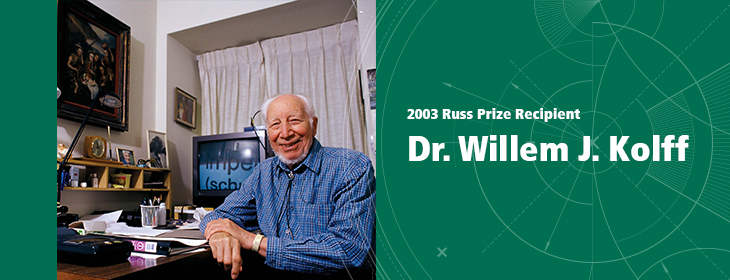2003 Russ Prize
Willem J. Kolff, distinguished professor of surgery and medicine, emeritus, at the University of Utah, is considered the "father" of the field of artificial organs. Today, thanks to Kolff's groundbreaking work on the artificial kidney, more than 1.2 million patients worldwide are maintained through the life-sustaining therapy of hemodialysis, which is offered in nearly every country in the world.
Hemodialysis is the most common method used to treat advanced and permanent kidney failure. In hemodialysis, blood flows, a few ounces at a time, through a machine with a special filter that removes wastes and extra fluids. The clean blood is then returned to the body. Removing harmful wastes and extra salt and fluids helps control blood pressure and keep the proper balance of chemicals like potassium and sodium in the body.
Kolff was born in 1911 in Leyden, Holland. After graduating from Leyden Medical School in 1938, the first of Dr. Kolff's remarkable accomplishments occurred in occupied Holland, during World War II, where he developed the first practical artificial kidney with materials scrounged from a local factory and carefully concealed from the Nazis. Although cumbersome by modern standards, this first practical hemodialyzer was as effective as it was resourceful. In September 1945, the device saved its first patient.
Kolff and his family immigrated to Cleveland, Ohio, in 1950, where he became head of the department of artificial organs and professor of clinical investigation at the Cleveland Clinic Foundation. There he began work on an artificial heart, and in 1957 the implantation of a totally artificial heart in the chest of an animal was accomplished for the first time. Kolff left Cleveland in 1967 to continue his work on the artificial heart. He arrived at the University of Utah and became director of the Institute for Biomedical Engineering and its artificial organs division. Under Kolff's leadership, the University of Utah has since developed one of the world's leading artificial organ research centers. In 1982, under his supervision, the first "permanent" artificial heart was implanted in a human patient, Barney Clark. Other contributions to the field of medicine by Kolff include the membrane oxygenator, artificial vision and his latest work on a wearable artificial lung.
More than 300 articles in scientific journals bear Kolff's name. In addition, he has received many prestigious awards including the Armory Prize, the Valentine Medal and Award for "outstanding contributions to the field of urology," the Cameron Prize for Practical Therapeutics, the American Medical Association's Scientific Achievement Award and the Lasker Clinical Award; and he has been named to the National Inventors Hall of Fame. Perhaps his most impressive award is the rank of Commander in the Order of Oranje-Nassau by Queen Juliana of the Netherlands. His was the first time the award had been presented to an individual living in the United States, and is the highest tribute for accomplishment in the field of science, which can be conferred by the government of the Netherlands upon a native of that country.
Kolff received his M.D. from the University of Leyden Medical School, Holland, in 1938, as well as his Ph.D. from the University of Groningen, Holland. He resides in Newtown Square, Penn.
Meet Dr. Kolff.
